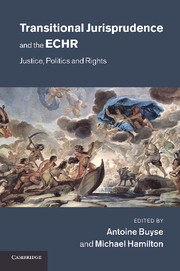Book contents
- Frontmatter
- Contents
- Foreword
- Acknowledgements
- 1 Introduction
- 2 Transitional emergency jurisprudence
- 3 Rights and victims, martyrs and memories
- 4 Confronting the consequences of authoritarianism and conflict
- 5 Freedom of religion and democratic transition
- 6 The truth, the past and the present
- 7 Transition, political loyalties and the order of the state
- 8 Transition, equality and non-discrimination
- 9 Closing the door on restitution
- 10 The Inter-American human rights system and transitional processes
- 11 The ???transitional??? jurisprudence of the African Commission on Human and Peoples??? Rights
- 12 Conclusions
- Index
- References
4 - Confronting the consequences of authoritarianism and conflict
the ECHR and transition
Published online by Cambridge University Press: 07 September 2011
- Frontmatter
- Contents
- Foreword
- Acknowledgements
- 1 Introduction
- 2 Transitional emergency jurisprudence
- 3 Rights and victims, martyrs and memories
- 4 Confronting the consequences of authoritarianism and conflict
- 5 Freedom of religion and democratic transition
- 6 The truth, the past and the present
- 7 Transition, political loyalties and the order of the state
- 8 Transition, equality and non-discrimination
- 9 Closing the door on restitution
- 10 The Inter-American human rights system and transitional processes
- 11 The ???transitional??? jurisprudence of the African Commission on Human and Peoples??? Rights
- 12 Conclusions
- Index
- References
Summary
Introduction
On 6 November 1996 Croatia was formally admitted into the Council of Europe as the third former Yugoslav state to join the organization. The Council of Europe’s cautious expansion into the territories which formerly comprised the Socialist Federal Republic of Yugoslavia (SFRJ) expanded the geographic application of the European Convention of Human Rights to include states emerging from both conflict and authoritarianism. From the perspective of aspirant former Yugoslav states, membership in the Council of Europe constituted an achievable foreign policy goal for states seeking integration into Euro-Atlantic institutions. Indeed, Croatia’s admission to the Council of Europe was, for Croatian president Franjo Tudjman, a primary focus of Croatian diplomatic efforts in the months following the 1995 Dayton Agreement. To be sure, the extent to which Tudjman desired membership in the Council was illustrated by the fact that prior to Croatia’s accession, Tudjman’s illiberal government accepted numerous human rights commitments that extended beyond the scope of the Council’s core human rights treaties.
- Type
- Chapter
- Information
- Transitional Jurisprudence and the ECHRJustice, Politics and Rights, pp. 81 - 102Publisher: Cambridge University PressPrint publication year: 2011



